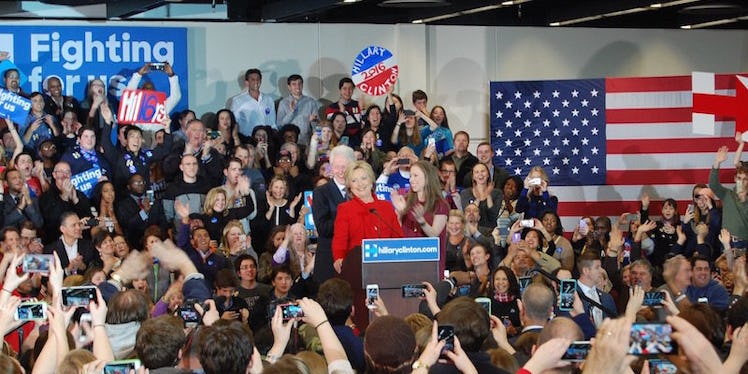
Hillary Clinton Will Have To Try Harder If She Wants Our Vote
At the Drake University Democratic caucus in Des Moines, Iowa it looked like it was going to be a very, very sad night for Hillary Clinton.
When the initial count of voters for Democratic nominees at the Drake caucus was added up, Clinton was losing. She had 107 people in her corner -- less than half of the 248 voters for Bernie Sanders.
Even Martin O'Malley had more support, coming in with 108 people in his corner.
So it was confusing to walk out of the Drake caucus to find O'Malley had dropped out of the campaign after getting so few votes and Clinton and Sanders were essentially tied in votes.
The Drake University caucus was filled mostly with students voting for the first time. The size of the room was picked based on how many people showed up at previous caucuses, and the O'Malley precinct captain said they were told to expect around 50 people total at the caucus.
There were 485 voters stuffed into the basement lecture hall.
Clearly, young people are fired up about this election.
But they're also clearly not fired up about Hillary Clinton.
Of the voters between 17 and 29 years of age, a staggering 84 percent voted for Sanders while just 14 percent voted for Clinton, according to the New York Times. That is a hugely significant statistic.
Clinton may have tied Sanders in general in Iowa, but she lost by a massive margin when it came to young people.
Bernie has been gaining momentum through young voters who are excited by his promises to reform economic systems that have hurt Millennials (although whether or not those promises are actually doable is way up in the air).
Somehow, a 74-year-old white dude with decades of work in the government has convinced our generation that he is a non-establishment breath of fresh air.
But it's not even just Bernie fever hurting Clinton's standing among Millennials.
There's obviously a lack of enthusiasm -- and active dislike -- for Clinton. In fact, some of the students in the O'Malley section at the Drake caucus indicated they weren't there to support O'Malley but to take votes away from Clinton. This makes up the "anyone but Hillary" contingent.
Clinton has been in the public eye for literally as long as many of us have been alive, placing her clearly as part of the establishment. Even if she wasn't the one making the decisions that hurt our generation, we associate her with the leaders who got us to where we're at.
Meanwhile, there are strong campaigns against her on both the Democratic and Republican sides of the aisle.
Both sides call her a liar willing to do whatever it takes to get the vote, bringing up her role in the 2012 Benghazi attack and the ridiculousness of her email scandal -- although some of those attacks saying "she's dishonest" might be motivated by sexism.
Clinton can get all the endorsements in the nation, but all that shows to young people is she knows how to work a system.
After all, Hillary Clinton is a good, experienced politician. She knows what she's doing, she knows how the system works, she knows what's reality and what's false promises. But in this election cycle, that experience is turning out to be a mark against her with people who don't trust and are fed up with politicians. Not to mention, pragmatism and reality aren't exciting.
The Iowa vote has proven if Hillary wants to win votes from our generation, she's going to have to work harder and it's going to take innovation from her campaign.
She has to show Millennials what makes her exciting. She has to find a way to make young voters see experience isn't a bad thing, but an advantage she can use to help the generation. She has to have more emotional openness to show her human side, which many Millennials don't see.
Ultimately, the Iowa caucus showed if she wants to win the Democratic nomination, she has to get young voters in her corner.